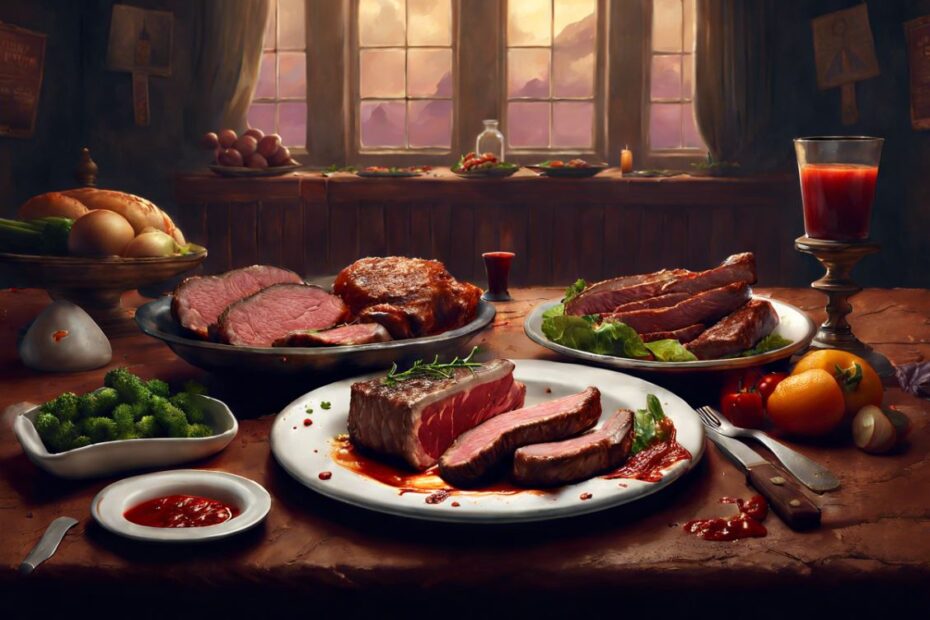Eating meat on Fridays during Lent is a controversial issue for Catholics. For centuries, abstaining from meat on Fridays was considered a binding law with consequences like mortal sin if disobeyed. However, changes in recent decades have led to confusion around the sinfulness of eating meat during the Lenten season of penance and fasting. This article explores the history and current stance of Catholic teaching on this issue.
The key question is whether eating meat on Lenten Fridays is still considered a sinful act that requires confession and penance. Throughout history, the Catholic Church has emphasized fasting and abstinence during Lent as a form of repentance and self-denial in union with Christ’s suffering. The practice of abstaining from meat on Fridays comes from the tradition that Christ died for our sins on the Friday before Easter. Over time this spiritual discipline was formalized into Church law with strict obligations.
What does the Bible say about eating meat on Fridays?
- Is abstaining from meat explicitly mentioned in Scripture?
- Did Jesus or early Christians avoid meat on certain days?
- What is the origin of the tradition in Catholicism?
When did the rule of abstaining from meat on Fridays begin?
- What is the history of this practice in the Catholic Church?
- When did it become a strict obligation backed by Church law?
- What was the penalty for not following this rule in past centuries?
Is it considered a mortal sin to eat meat on Fridays during Lent today?
- What do the current regulations in the Catholic Church dictate?
- Is it still a binding law for all Catholics?
- Does breaking the abstinence rule still constitute a grave, mortal sin?
What led the Church to change the strictness and binding nature of the Friday meat abstinence?
- Did Vatican Council II impact this rule and other Catholic observances?
- How has the Canon Law shifted over the 20th century regarding abstinence?
- Why focus more on personal choice rather than Church punishment?
Does the U.S. Conference of Catholic Bishops maintain any obligations for meatless Fridays?
- What guidelines do American Catholic leaders provide to the faithful during Lent?
- Is it still considered sinful to intentionally eat meat on Fridays without sufficient reason?
- Are there exceptions like for certain solemnities and feast days?
How do modern Catholics tend to view meat consumption on Lenten Fridays?
- Do many Catholics still avoid meat on Fridays as a matter of habit or piety?
- Is abstaining from meat seen more today as a voluntary practice rather than obligatory?
- What other observances have become more popular or replaced Friday abstinence?
Does Church teaching still require some form of penance on Fridays year-round?
- Outside of Lent, what are Catholics asked to do for weekly penance nowadays?
- Is the duty to do penance, prayer, and acts of charity still present even if abstaining from meat is not required?
- What is the spirit behind the modern Catholic approach to Lenten sacrifice?
To conclude, the ban on eating meat on Lenten Fridays is no longer considered a grave, mortal sin per se in the Catholic Church based on current regulations. However, intentionally disregarding other forms of Friday penance and the overall spirit of repentance in Lent could still constitute sin. Many Catholics choose to observe abstinence from meat on Fridays as a voluntary sacrifice and spiritual discipline during this holy season focused on Christ’s passion.
Some key points to remember:
- Abstaining from meat on Fridays used to be required year-round and considered a mortal sin if knowingly disobeyed
- The strictness and binding threat of sin for violating this rule changed significantly over the 20th century
- The U.S. Bishops maintain that Catholics should still abstain from meat on Lenten Fridays today, even if not a grave sin
- Most view meat abstinence as voluntary but still participate for reasons like tradition, habit, or personal piety
- The Church still requires forms of penance from Catholics on all Fridays as part of weekly spiritual discipline
So in the end, the complex answer is that eating meat on Friday during Lent is probably not perceived as inherently sinful anymore by the Church. Yet purposefully ignoring Lenten penance expectations altogether could still disappoint God and damage one’s soul and relationship with Christ. The safest path is to err on the side of caution by maintaining some voluntary abstinence and sacrifice.

